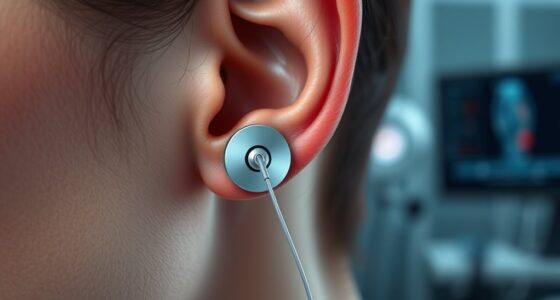Navigating through the challenges of asymmetrical hearing loss and tinnitus can feel like maneuvering through a maze – full of surprises, but solutions are possible.
We'll explore practical tips and techniques that can provide relief and improve quality of life for those dealing with these auditory challenges.
From lesser-known holistic remedies to lifestyle modifications and environmental adjustments, there's a wealth of information to uncover that could make a significant difference in your daily experience with hearing loss and tinnitus.
Key Takeaways
- Regular exercise improves blood flow for hearing health and tinnitus relief.
- Stress reduction techniques like meditation help lower tinnitus severity.
- Environmental adjustments reduce background noise for improved hearing clarity.
- Dietary choices rich in antioxidants support inner ear health and symptom management.
Lifestyle Modifications for Hearing Health
Incorporating simple lifestyle adjustments can significantly enhance our hearing health and potentially alleviate symptoms of tinnitus. When it comes to hearing and tinnitus management, engaging in regular physical exercise plays a crucial role. Exercise improves blood circulation, benefiting overall ear health and potentially reducing tinnitus symptoms. Additionally, maintaining a healthy diet rich in antioxidants, vitamins, and minerals supports auditory function, minimizing oxidative stress that may contribute to tinnitus.
Stress reduction techniques are also vital in managing tinnitus and promoting better hearing health. Practices like meditation, yoga, or deep breathing exercises help lower cortisol levels, which can aid in tinnitus management. Furthermore, limiting exposure to loud noises and using ear protection in noisy environments are essential to prevent further hearing damage and potentially alleviate symptoms of asymmetrical hearing loss.
Hydration is key to ensuring proper fluid balance in the inner ear, crucial for optimal hearing function and potentially helping alleviate tinnitus symptoms. By adopting these lifestyle modifications, we can take proactive steps towards maintaining our hearing health and managing tinnitus naturally.
Holistic Remedies for Tinnitus

To further explore holistic approaches for managing tinnitus, let's consider alternative remedies such as acupuncture and herbal supplements. When it comes to tinnitus relief, incorporating holistic practices into your routine can offer gentle yet effective solutions.
- Acupuncture: This traditional Chinese medicine technique involves inserting thin needles into specific points on the body to help alleviate tinnitus symptoms.
- Herbal Supplements: Ginkgo biloba and melatonin are popular herbal remedies known for their potential to reduce tinnitus discomfort and improve overall well-being.
- Sound Therapy: Using white noise machines or listening to calming nature sounds can help mask the ringing in your ears and promote relaxation, making it easier to cope with tinnitus on a daily basis.
Dietary Strategies for Managing Symptoms
Consuming a diet rich in antioxidants and omega-3 fatty acids can play a key role in managing symptoms of tinnitus and asymmetrical hearing loss. Antioxidants like vitamin C, E, and beta-carotene help reduce inner ear inflammation, potentially improving tinnitus. Omega-3 fatty acids, found in fish and flaxseeds, have anti-inflammatory properties beneficial for individuals with these conditions.
To manage Meniere's disease symptoms, it's essential to avoid high-sodium foods. Including magnesium-rich foods such as nuts and leafy greens can regulate blood flow to the inner ear, easing tinnitus. Limiting caffeine and alcohol intake is crucial as they can worsen symptoms. By adopting these dietary strategies, individuals can support their overall ear health and potentially alleviate the impact of these conditions.
Exercise and Stress Management Techniques

Regular exercise and stress management techniques are essential components in naturally managing symptoms of asymmetrical hearing loss and tinnitus. Engaging in physical activity and adopting stress reduction practices can have a positive impact on both conditions.
- Improved Blood Circulation: Regular exercise can enhance blood flow to the ears, potentially benefiting individuals with asymmetrical hearing loss and tinnitus by providing better nutrient and oxygen delivery to these areas.
- Stress Reduction: Techniques like yoga, meditation, and deep breathing exercises can help lower stress levels, potentially reducing the perceived severity of tinnitus and improving overall well-being.
- Release of Endorphins: Physical activity triggers the release of endorphins, which act as natural pain relievers and mood enhancers. This can help alleviate the emotional impact of tinnitus and promote a more positive mood.
Environmental Adjustments for Better Hearing
Making adjustments to your environment can significantly enhance your hearing clarity and overall auditory experience, especially for individuals with asymmetrical hearing loss. For those with sensorineural hearing loss in one ear, environmental modifications play a crucial role in improving the quality of sound and life.
By reducing background noise and incorporating sound-absorbing materials, such as carpets or curtains, individuals can improve their ability to hear more clearly. Optimal positioning of furniture and seating arrangements can also help direct sound towards the better ear, facilitating better communication.
Visual cues and well-lit spaces can compensate for auditory challenges, while specialized alert systems like visual doorbells and vibrating alarm clocks enhance safety and awareness. Establishing quiet zones within living or work environments offers a reprieve from auditory overload, supporting better hearing experiences.
These adjustments not only improve the sound environment but also contribute to a more comfortable and inclusive space for individuals with asymmetric hearing loss.
Frequently Asked Questions
How Do You Get Rid of Tinnitus With Hearing Loss?
We understand the challenge of dealing with tinnitus alongside hearing loss. Many find relief through lifestyle adjustments, like limiting caffeine and alcohol.
Sound therapy, such as white noise machines, can help mask tinnitus sounds. Cognitive behavioral therapy aids in managing distress.
Using hearing aids can improve overall hearing, lessening tinnitus impact. Regular exercise and stress management techniques may also alleviate symptoms.
It's about finding what works best for you.
Does Sitting in Silence Help Tinnitus?
Sitting in silence may not directly help tinnitus as it can make the ringing or buzzing sounds more noticeable without external noise masking them. Some find relief by using background noise like white noise machines or calming music to distract from tinnitus sounds.
Engaging in peaceful activities can reduce stress levels, indirectly improving tinnitus symptoms. Consulting a healthcare provider for personalized recommendations on sound therapy and relaxation techniques is essential for effective tinnitus management.
How Do You Live With Constant Tinnitus?
Living with constant tinnitus can be challenging, but we've found that incorporating relaxation techniques and creating a soothing environment with background noise can help manage the symptoms.
Maintaining a healthy lifestyle with exercise, a balanced diet, and enough sleep is crucial. Avoiding triggers like loud noises, caffeine, and alcohol can also make a difference.
Seeking support from tinnitus groups or counseling has provided emotional relief and coping strategies for us.
What Should You Not Do With Tinnitus?
When managing tinnitus, it's crucial to avoid triggers that can worsen symptoms.
Loud noises, cotton swabs for ear cleaning, excessive caffeine, alcohol, high-salt diets, and smoking can all intensify tinnitus.
By steering clear of these actions, we can help minimize the impact of tinnitus on our daily lives.
Conclusion
In conclusion, managing asymmetrical hearing loss and tinnitus naturally involves a combination of lifestyle changes, holistic remedies, dietary strategies, and environmental adjustments.
By taking a holistic approach and incorporating these techniques into daily life, individuals can find relief and improve their quality of life.
So, why not take the first step towards better hearing health today?










